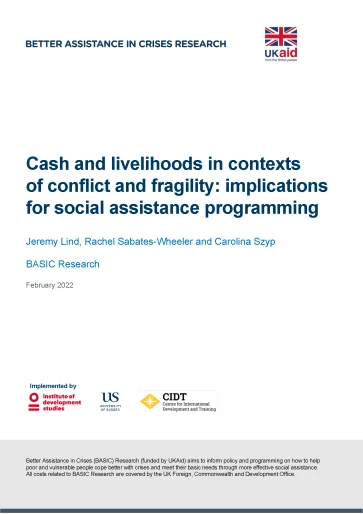Cash and Livelihoods in Contexts of Conflict and Fragility: Implications for social assistance programming
This paper examines the role of cash-plus programming (including graduation) for livelihoods, income, protection, and health outcomes in contexts of different conflict intensity. We assess the origins of cash-plus programming (including graduation) for livelihoods outcomes as it has developed in settings that are more peaceful and where social protection systems are stronger. The paper then considers fragile and conflict-affected settings (FCAS), where social protection systems are often weak, and the threat of conflict-related violence undermines livelihoods as well as programming operations. We introduce a simple framework to understand programming contexts in FCAS, using both the strength of the social protection system as well as the intensity of conflict to identify four broad categories or landscapes for cash-plus programming. We use this framework to present the findings of a comprehensive review and analysis of 42 cash-plus programmes in 17 fragile and conflict-affected countries. This review maps key features in design and implementation of social and humanitarian cash assistance augmented by livelihood support across FCAS. There is significant variation, and few dominant patterns, in the objectives, coverage, duration, type of support, implementers, and impacts of programmes. This reflects the very different landscapes of conflict and systems of social assistance provisioning that exist across the countries covered in the review. Finally, we draw out lessons, questions, and challenges for programme design and implementation across different contexts and provide suggestions for future deeper research on these themes in the Better Assistance in Crises (BASIC) Research programme.



